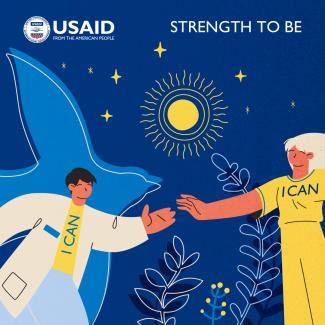Dr. Tetiana was displaced from her home in Rubizhne, Luhansk region in the early days of Russia’s war, leaving under fire from Russia’s forces. She arrived in a small town in Kyiv region on March 11, 2022, along with her mother, her child, and her dog. Just six days later, Dr. Tetiana approached the Primary Health Care Center in her new town, where she was offered a job as a family doctor. Since then, Dr. Tetyana has been hard at work, not only adapting to a new home, new patients, and new colleagues, but a new context too. Now, alongside treating injuries and disease, she also works daily with people suffering from trauma, grief, and depression caused by Russia’s war.
"I see their eyes and understand everything. I feel with my bones how traumatized people are because of the combat. And it's not just about those who were directly involved,” she explains.
An estimated half of all Ukrainians will need help with their mental health as a result of Russia’s war. Realizing that she needed to rapidly improve her skills to provide her patients with the support they need, Dr. Tetiana was among the first healthcare providers to attend one of three mental health support training centers at veterans’ spaces established in Kyiv, Zhytomyr, and Khmelnytskyi regions with support from USAID. Along with other healthcare professionals, Dr. Tetiana learned how to communicate with veterans, their families, and others who have experienced the trauma of Russia’s war.
"The main thing in our profession is to look away from the laptop when people come to see us. Do not look away when you see a person with injuries. The other day, a family came to see me. The father had obvious injuries. I know he was at the front. I got up from my desk, greeted him, made eye contact, and examined the injuries. It was a completely different communication. Family doctors should show respect and empathy for those who protect us at the front."
In small towns across Ukraine, family doctors like Dr. Tetiana are one of the only entry points for patients to access mental health and psychosocial support services. USAID has provided training to 12 trainers who work at training centers at veterans’ spaces in Kyiv, Zhytomyr, and Khmelnytskyi oblasts. Since October 2023, they have trained 302 family doctors, 61 social workers, and other professionals who work with returned veterans, opening up access to mental health services for more than 300,000 people.

